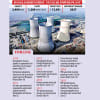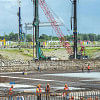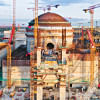Mega dredging scheme okayed
The government is going to launch a Tk 956-crore river dredging project for smooth transportation of heavy equipment of Rooppur nuclear power plant from Mongla to Pakshey.
The Executive Committee of the National Economic Council (ECNEC) yesterday approved the project for dredging the river route from Mongla via Chandpur-Mawa-Goalanda to Pakshey to be implemented by 2025.
The planning ministry has informed ECNEC that the main objective of the project is to improve navigability of the river route from Chittagong and Mongla ports to Rooppur to safely and smoothly transport heavy equipment for Rooppur Nuclear Power plant.
The planning ministry officials said heavy machineries to be imported for the costly project would be taken from the sea ports to Pakshey on river route and from there to Rooppur in Pabna.
The rivers in Bangladesh carry 2.4 billion tonnes of silt every year. To maintain navigability the dredging would continue till the implementation of the power plant.
The officials added the machineries of the plant are expected to start arriving from next year.
In December last year, ECNEC gave the nod to the Rooppur project involving Tk 113,093 crore which is the most expensive project in the history of Bangladesh. Russia's state export credit will account for Tk 91,040 crore or 80.5 percent of the total project cost.
The river dredging project will be implemented with the government's own resources.
Bangladesh has already received $500 million for initial work of the 2,400-megawatt power project, which kick-started in July 2016. The project is expected to be complete by December 2025.
Russia's state-owned Rosatom State Atomic Energy Corporation will implement the project. As per the plan of Rosatom, the main construction would start this year. The first unit is expected to go into production in 2022 and the second in 2023.
The plant would use a new generation reactor that has a lifespan of 60 years with the option of extending it for another 20 years, according to a planning ministry official.
The reactor contains improved safety features and its passive safety system is capable of working for 72 hours in case of any critical or emergency situations, the official added.
In 2009, the government initially estimated that the plant would cost between $3 billion and $4 billion.

 For all latest news, follow The Daily Star's Google News channel.
For all latest news, follow The Daily Star's Google News channel. 








Comments